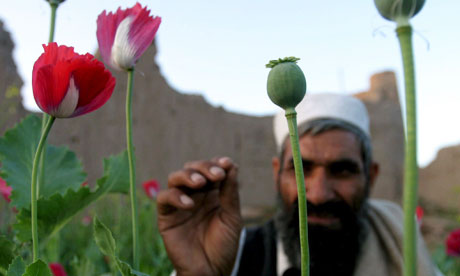
Organised international crime is worth up to $870bn (£560bn) a year, the United Nations has estimated at the launch of a campaign against illegal trade in everything from people to guns, drugs and endangered species.
The turnover of transnational criminal networks is worth more than six times the global aid budget, or around 7% of the world's legal exports, the UN Office on Drugs and Crime (UNODC) said.
There is also a high cost in human lives and economic stability with crime groups bringing "increasing domestic corruption, extortion, racketeering and violence".
"Criminal groups traffic women for sexual exploitation and children for purposes of forced begging, burglary and pickpocketing. Fraudulent medicines and food products enter the licit market and not only defraud the public but can put their lives and health at risk," the UN said at the launch of the campaign that aims to underline that "there is always a victim".
By far the most lucrative trade, well over a third of the total, is in narcotics, which has an annual value the UN estimates at $320bn. Second is the trade in counterfeit goods, which generates around $250bn.
Human trafficking generates $32bn a year, with an estimated 2.4 million victims affected at any one time.
"Transnational organised crime reaches into every region, and every country across the world. Stopping this transnational threat represents one of the international community's greatest global challenges", the UNODC executive director, Yury Fedotov, said.
Police and other security officials needed more sophisticated tools to fight criminal networks that were taking full advantage of technological improvements, the UN said.
More than two-thirds of criminal profits were estimated to be fed through the financial system, but less than 1% were intercepted and confiscated.
"Better intelligence methods need to be developed through the training of more specialised law enforcement units, which should be equipped with state-of-the-art technology," the UN said, suggesting poor nations needed more help.
"Organised crime adds to an increase in public spending for security and policing and undermines the very human rights standards that many countries strive to preserve … Developing countries need assistance in building their capacity to counter these threats."
In Afghanistan, a desperately impoverished country on the frontline of the narcotics trade, criminal networks feed both government corruption and a tenacious insurgency.
The country produces around 90% of the world's opiates – the 2011 crop was nearly 6,000 tonnes – most of it grown in the Taliban's southern strongholds. High value, low volume and easy to store for years if needed, it is a hard crop to convince farmers to replace in poor and volatile areas.
But not just the south is affected; opiates trafficked out of northern Afghanistan alone were worth around $400m in 2010, according to a UN report. As the north is a relatively safe area, this trade is believed to be flourishing with the support of government officials.
"Corruption rather than insecurity appears to be the main corollary to high-volume opiate trafficking in northern Afghanistan," the report said.








0 comments:
Post a Comment
NO ADVERTISING ACCEPTED ON COMMENTS